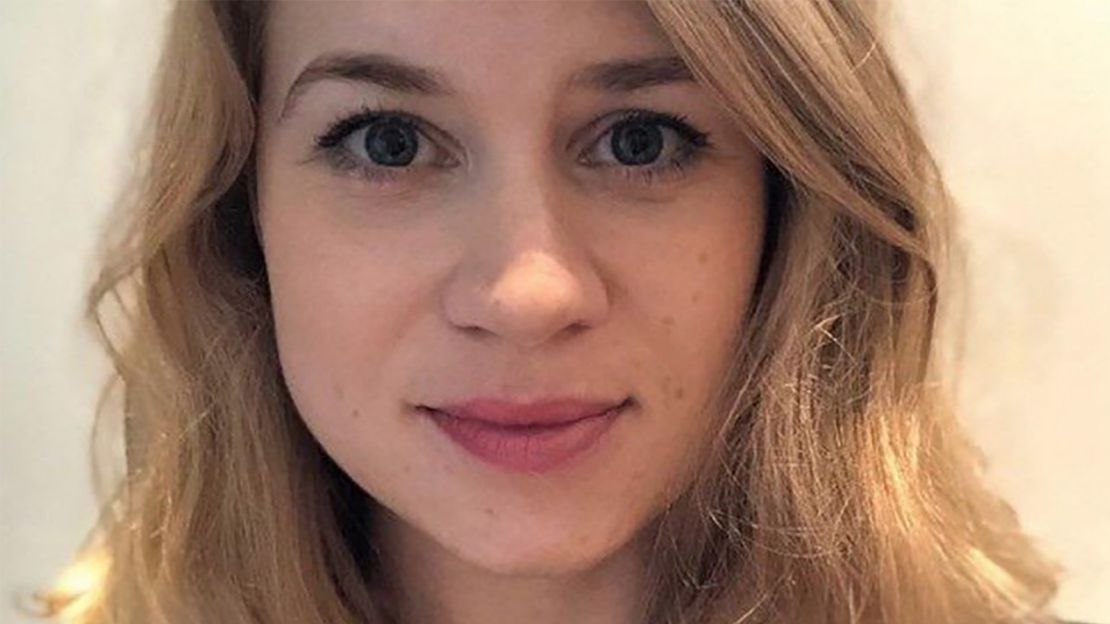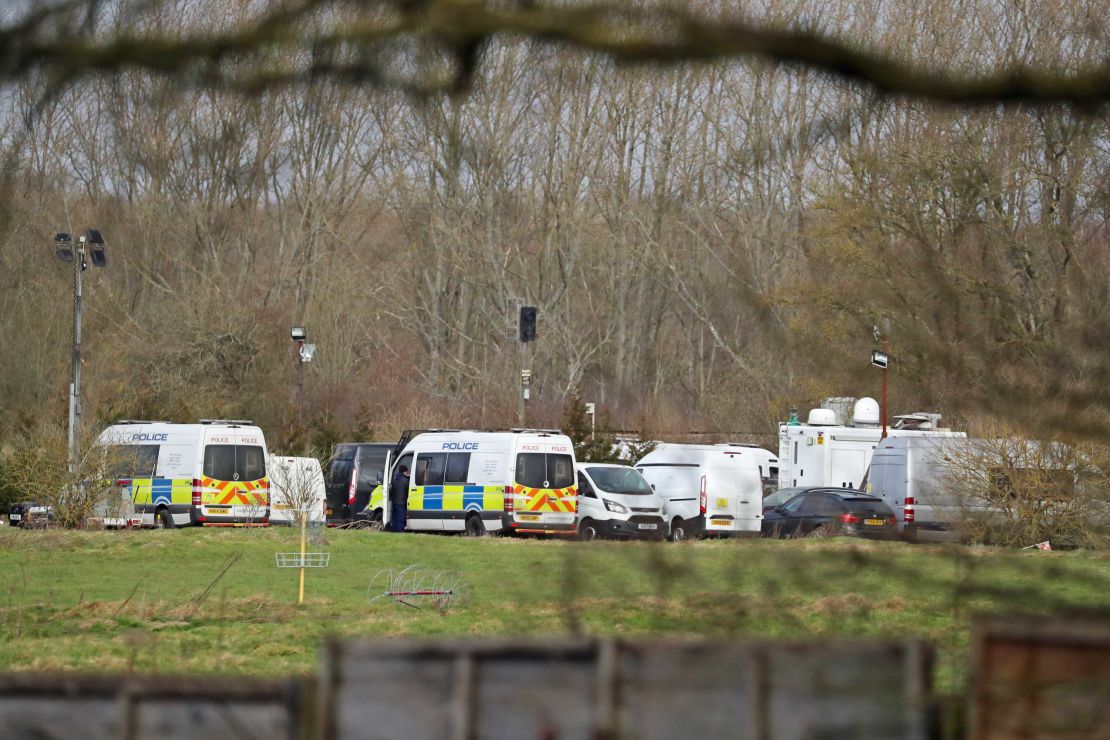The disappearance of Sarah Everard, a 33-year-old marketing executive, while walking home in London one evening has sparked an outpouring on social media from women sharing their own experiences of sexual assault and harassment.
Many have also exchanged notes on the habitual precautions they take to try to stay safe when they walk alone – and voiced their anger and frustration that this feels necessary.
The fact that a serving Metropolitan Police officer has been arrested on suspicion of Everard’s kidnap and murder has only added to the sense of threat.
The officer sustained a head injury and was hospitalized while in custody on Wednesday police told CNN. The suspect has since been discharged from hospital and returned to police custody.
Police searching for Everard, who was last seen on March 3 in Clapham, south London, have found what appear to be human remains in woodland in Kent, the force confirmed late Wednesday.
Metropolitan Police Commissioner Cressida Dick pointed out that it was “incredibly rare for women to be abducted” in the streets.
But, she added, “I completely understand that despite this, women in London and the wider public – particularly those in the area where Sarah went missing – will be worried and may well be feeling scared.”
Police making door-to-door inquiries in the case reportedly warned women not to venture out alone, prompting some to comment that this approach only fuels the culture of blaming victims.
A “Reclaim These Streets” vigil has been organized via Facebook for 6 p.m. Saturday on Clapham Common, a green space Everard is believed to have crossed soon after 9 p.m. as she walked toward her home in Brixton. “This is a vigil for Sarah, but also for all women who feel unsafe, who go missing from our streets and who face violence every day,” the organizers said. Attendees are urged to follow Covid-19 safety guidelines and must wear a face covering.
The deluge of social media reaction provides ample evidence of women’s concerns and are testament to the toll that a lifetime of vigilance takes on women’s well-being.
From taking a longer route home to avoid poorly lit streets to factoring in the possible need to flee as they dress for a night out, women are undertaking constant risk assessments when they walk alone, especially at night.
“For all those women who text their mates to let them know they got home safe, who wear flat shoes at night so they can run if they need, who have keys in their hands ready to use, it’s not your fault,” tweeted Anna Yearley, joint executive director of legal action NGO Reprieve. “It never is. So many of us have stories of being assaulted. It’s never our fault.”
Another Twitter user, Linda Redford, responded: “This a constant preoccupation of women and girls of all ages; I am 74 and still go through the mental risk assessment each time I am out on my own especially, but not exclusively, at night. I taught the same to my daughters. Fear passed on from woman to girl thru generations.”
Television and radio presenter Shelagh Fogarty posted a list of instances of sexual harassment starting at age 10 and continuing into her 50s, from being followed home from school to being targeted by a stalker. “This is what women face. This and worse. Throughout our lives. It’s sh*t. It’s draining. It’s frightening. It has to stop,” she said.
Other women responded with their own, similarly depressing lists. After posting hers, Eleanor Johnston, a clinical psychologist, added: “My early experiences are by no means unusual. What is important to remember is that ‘men’ are not inherently dangerous! Some men are. If this conversation can help all of us start a convo about callling out this behaviour, we would all feel a lot safer.”

Sexual harassment
While instances of abduction are relatively rare in the UK, new polling indicates that sexual harassment and abuse are not.
Over 70% of women surveyed by UN Women UK said they had experienced sexual harassment in public spaces. That figure rose to 97% among women aged 18 to 24, polling showed. The data, released Wednesday, was drawn from a YouGov survey of over 1,000 women commissioned by UN Women UK in January 2021.
The organization’s polling also suggested that women have little faith in public institutions to tackle the situation.
“Only 4% of women told us they reported the incidents of harassment to an official organisation – with 45% of women saying they didn’t believe reporting would help change anything,” UN Women UK said.
One in four women in the UK will experience domestic abuse and one in five sexual assault during her lifetime, according to a paper published by the Home Office in 2019.
Of course, women are not alone in feeling under threat on the streets. And men are more likely to be the victims of violent crime involving strangers and acquaintances than are women, according to the annual Crime Survey for England and Wales, published by the UK Office for National Statistics (ONS).
But government data show that men are far more likely to be prosecuted for acts of violence against both women and men. Over the three-year period ending March 2020, the vast majority of suspects convicted of homicide were male – 93% of the total, according to an ONS report on homicide.
‘No woman finds this shocking’
The outpouring on social media in relation to the Everard case speaks volumes.
While some voiced their frustration over persistent victim-blaming, others highlighted how, once again, women were the ones being urged to change their behavior in order to stay safe, rather than the onus falling on men.
Georgia Ladbury, an infectious disease epidemiologist and candidate for the Women’s Equality Party in upcoming London Assembly elections, tweeted Tuesday: “Women in my area have been advised ‘not to go out alone’ while Sarah Everard’s disappearance is investigated. How about we urge men not to go out instead? Say a curfew at nightfall?
“Perhaps we’d see more done about street safety if it were men losing their freedoms, not women.”
In another tweet Thursday, she added: “No woman finds this shocking. Because we’re constantly planning and strategising how to prioritise our safety. Meanwhile, men are just living their lives and having carefree conversations. The very idea of that kind of freedom is intoxicating to me.”

Speaking in the House of Lords during a debate Thursday on domestic violence, Green Party peer Baroness Jenny Jones proposed imposing a 6 p.m. curfew for men. “I would argue that, at the next opportunity for any Bill that is appropriate, I might actually put in an amendment to create a curfew for men on the streets after 6 p.m., which I feel would make women a lot safer, and discrimination of all kinds would be lessened.”
Critic and columnist Sarah Ditum tweeted about “men’s horror at the idea of a man curfew,” adding: “No one should have their freedoms curtailed because of the violence of a minority, except women curtail our freedoms all the time because of the violence of a minority of men – but freedoms aren’t for women, are they?”
Writer Caitlin Moran made a similar point. “Being a woman: my ‘outside’ day finishes at sundown. If I haven’t taken the dog for a walk/jogged by then, I can’t,” she tweeted. “In the winter, it often means the choice between exercise and work. Today, I had to stop work at 4 to exercise. My husband worked until 6, and is now off for a run.”
Call for action
Men have also been joining in the conversation on Twitter, many in positive ways.
One tweet, from Stuart Edwards, has been widely shared. “I live less than five minutes from where Sarah Everard went missing. Everyone is on high alert. Aside from giving as much space as possible on quieter streets and keeping face visible, is there anything else men can reasonably do to reduce the anxiety/spook factor?” he asked.
Women responded with appreciation that the question had been asked and offered practical suggestions such as a man dropping back or crossing the road so as to reassure a woman that she was not being followed, or offering to walk a female friend home.
Meanwhile, lawmaker Jess Phillips, of the opposition Labour Party, called for tougher action to be taken against those who commit crimes against women, noting that rape convictions and domestic abuse prosecutions had fallen last year.
“We are not tough on crimes against women and children perpetrated by men,” she tweeted. “Women should be able walk the streets free from harm, fear and threat.”
Dick, London’s highest-ranking police officer, said there would be “continued high levels of police patrols” in the south London area where Everard was last seen, and acknowledged the impact of the suspected involvement of a police officer on public confidence.
“Sarah’s disappearance in these awful and wicked circumstances is every family’s worst nightmare,” she said.
“The news today that it was a Metropolitan Police officer arrested on suspicion of Sarah’s murder has sent waves of shock and anger through the public and through the whole of the Met.”





